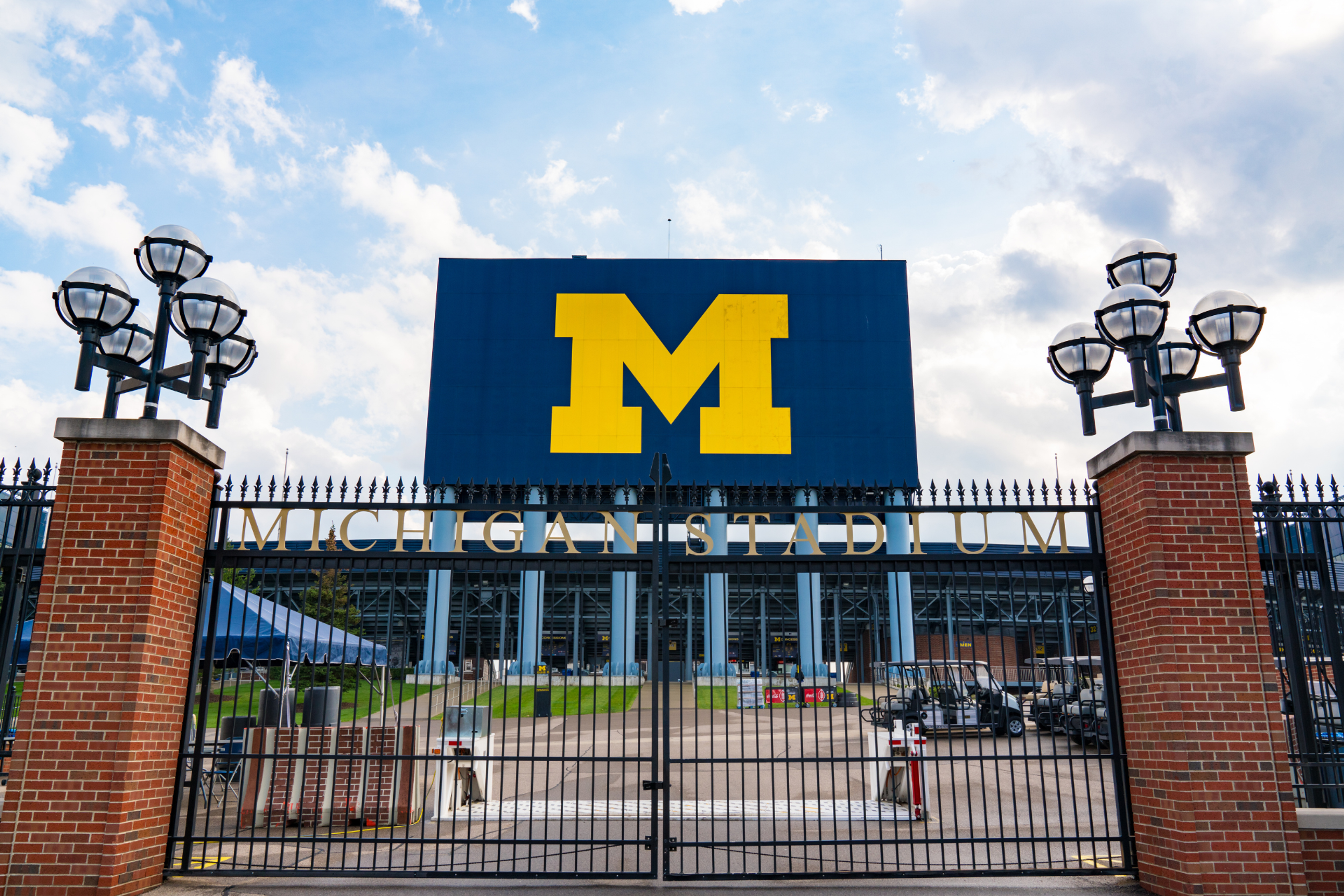The 10 Best Colleges for Business in the US
An overview of the best colleges for aspiring business majors with the school description, class profile, available concentrations, and tuition rates.
Posted June 13, 2025

Join a free event
Learn from top coaches and industry experts in live, interactive sessions you can join for free.
Table of Contents
Business majors are one of the most common undergraduate specializations because of the job opportunities, competitiveness, career preparedness, networking, and average compensation. Within a school’s business school, there are typically many majors, including Accounting, Finance, Supply Chain Management, Marketing, and Human Resources, among others. If you know that you want to pursue a career in business before entering college, it may benefit you to narrow down your list of schools to apply for based on the caliber of their business schools.
Interested in other disciplines? See:
Best Colleges for Business
1. University of Pennsylvania

The University of Pennsylvania is the world’s first collegiate business school and strives to continue this tradition of excellence. Undergraduate students will take classes at the Wharton School; however, they will take at least a third of their classes in the other eleven schools at UPenn in order to earn a holistic education. The flexible business programs combine technical fundamentals with the arts and sciences and offer access to well-known, dynamic professors and hands-on experiences.
All Wharton undergraduate business students graduate with a B.S. in economics but can also choose to pursue a concentration in an area of their choice. There are over 18 concentrations available, made possible by the variety of professors and departments. Students who want to concentrate on an area that is not available may work with a professor to do so.
Available Concentrations:
- Accounting
- Behavioral Economics
- Business Analytics (STEM-designated)
- Business Economics & Public Policy (STEM-designated)
- Business, Energy, Environment, and Sustainability
- Entrepreneurship & Innovation
- Finance
- Healthcare Management & Policy
- Legal Studies and Business Ethics
- Management
- Marketing
- Marketing & Communications
- Operations, Information, and Decisions (STEM-designated)
- Real Estate
- Retailing (Must be a secondary concentration)
- Social Impact and Responsibility (Must be a secondary concentration)
- Statistics (STEM-designated)
- Individualized
Wharton Undergraduate Class:
- # of Students: 2,500
- Pursued more than one degree: 30%
- Pursued a minor: 27%
- Studied abroad: 24%
- Women: 47%
- Students of color: 63%
- International: 22%
- First-generation: 12%
University of Pennsylvania Annual Tuition: $56,212
2. Massachusetts Institute of Technology

The MIT Sloan School of Management undergraduate program (“Course 15”) aspires to enable students with skills at the intersection of technical/quantitative expertise and business skills. The program is designed to provide students with a deep understanding of management education grounded in the scientific method; in other words, it is management for science-minded individuals.
Course 15 Majors:
- Management
- Business Analytics
- Finance
Sloan Undergraduate Class:
- # of Students: 120
- Women: 49%
- International: 4%
MIT Undergraduate Tuition: $57,590
3. University of California Berkeley

The undergraduate programs at the Haas School of Business are well-known for providing a high return on investment. Haas aims to teach its students both the management and technical skills they will need to thrive in the modern business world. The career center works actively to provide students with the resources they need to find and succeed in full-time roles. For the class of 2021, 77% graduated with a job offer, and the median starting salary was $88,840, well above the national average. Haas’ curriculum integrates business fundamentals with the university’s well-known liberal arts courses so that graduates have a well-rounded understanding of the arts, sciences, and business.
Academic Programs Available:
- B.S. in Business Administration: The standard (and highly competitive) business degree from Haas.
- Management, Entrepreneurship, and Technology Program: This is for students who are interested in both business and engineering.
- Robinson Life Sciences, Business, and Entrepreneurship Program (LSBE): A dual-degree program for students who would like to study both biology and business.
Haas Undergraduate Class:
- Applications Received (UC Berk students): 755
- Class Size: 245
- Average GPA: 3.79
- Underrepresented Minorities: 12%
- Women: 53%
UC Berkeley Tuition:
- California Resident: $14,254
- Out-of-State: $44,008
4. University of Michigan Ann Arbor

The Ross School of Business at Ann Arbor emphasizes that business should be an active process and this is reflected in the curriculum, through which students will analyze strategy, apply concepts, oversee projects, and build connections. Ross wants students who are interested in improving lives, benefiting society, and driving powerful change. It works to produce graduates who are prepared to excel in a business career. 94% of the 2021 graduates received a job offer from 235 companies, and the median base salary was $78,000.
The curriculum is designed holistically and doesn’t offer specific majors. However, about half of the classes are offered through other colleges and schools, giving students the flexibility to map out their own experiences. There are also several specializations available, outlined below.
Specializations Available:
- Dual Degree Programs – students must apply and be accepted into both degree programs independently
- Business + Art and Design
- Business + Engineering
- Business + Literature, Science, and the Arts
- Business + Information
- Business + Kinesiology
- Business + Music, Theatre, and Dance
- Focused Programs
- Cappo Sales Track
- Carson Scholars: Business and Public Policy
- Och Initiative for Women in Finance
- Centers, Institutes, and Initiatives
- Business + Impact
- Sanger Leadership Center
- Zell Lurie Institute for entrepreneurship and innovation
- Center for Positive Organization
- Erb Institute for Global Sustainable Enterprise
- William Davidson Institute for Emerging Market Economies
- …and more
Ross Undergraduate Class:
- Average High School GPA: 3.91
- Average SAT: 1480
- Average ACT: 34
- Women: 41%
- International: 5%
- Underrepresented Minorities: 15%
- In-State: 50%
UMich Ann Arbor Tuition:
- Lower Division Tuition (0-54 credits)
- Michigan Residents: $16,166
- Out-of-State: $51,736
- Upper Division Tuition (55+ credits)
- Michigan Residents: $20,480
- Out-of-State: $57,932
5. (Tied) New York University

Besides being located in one of the global hubs for business, NYU Stern offers a holistic business education, with 50% of the coursework grounded in Liberal Arts. There are five degree options available, and the average class size is only 40 people. Stern wants its students to understand the social impact that business has on the world; for this reason, there are four required social impact courses as part of the curriculum. In addition, NYU is partnered with 17 other business schools worldwide to provide students with opportunities for global immersion. 50% of Stern’s undergraduate students studied abroad for at least one semester.
Undergraduate Business Programs:
- BS in Business
- BS in Business and Political Economy
- BS in Business, Technology, and Entrepreneurship
- BS in Business/MS in Accounting
- BS in Business/BFA in Film and Television
Stern Undergraduate Class:
- Faculty: 417
- Applications: ~15,000
- Available Spots: 620
- Average SAT: 1531
- Countries Represented: 27
NYU Tuition & Fees: $28,567
5. (Tied) University of Texas Austin

The McCombs School of Business offers ten top-ranked majors for students. It’s aspiring to create a community that is prepared for the challenges of the modern business world. McCombs boasts an award-winning faculty, cost-effective education, many student clubs and organizations, global study opportunities, and a robust career management program.
Undergraduate Majors:
- Accounting
- Canfield Business Honors Program
- Finance
- Integrated MPA
- International Business
- ManagementMarketing
- Management Information Systems
- Business Analytics
- Supply Chain Management
McCombs Undergraduate Class:
- # of Students: 4719
- International: 1.6%
- Women: 47%
- First-Generation: 15.5%
UT Austin Tuition:
- Texas Residents: $6,788 (per semester)
- Out-of-State: $23,249 (per semester)
7. Carnegie Mellon University

The Tepper School of Business at CMU equips its students with the skills they need to solve problems at the intersection of business and technology. In the first year, undergraduate business students will take core classes that build on business fundamentals. After that, students can choose a concentration to gain expertise in a specific area. Tepper also has one of the lowest student-to-faculty ratios, so the professors are invested in the success of their students.
Undergraduate Business Concentrations:
- Accounting
- Business Analytics and Technologies
- Entrepreneurship
- Finance
- Global Economics and Business
- Marketing Management
- Operations Management
- Strategic Management
Tepper Undergraduate Class (2018-2019):
- Average SAT Score: 2142
- # of Students: 123
- Women: 41%
- Minorities: 48%
CMU Tuition: $59,864
8. (Tied) Cornell University

The Cornell SC Johnson College of Business offers two undergraduate business programs from two different schools: the Dyson School of Applied Economics and Management and the Nolan School of Hotel Administration. The Applied Economics program has flexible degree requirements which give students many opportunities to create their own undergrad experience. The Hotel Administration degree includes a mix of business education and a foundation in hospitality, services, and real estate. The curriculum at Johnson is based on a combination of world-class classroom instruction and hands-on experiential learning.
Program Concentration Options:
BS in Applied Economics and Management
- Accounting
- Agribusiness Management
- Applied Economics and Management
- Business Analytics
- Entrepreneurship
- Environmental, Energy, and Resource Economics
- Finance
- Food Industry Management
- International Trade and Development
- Marketing
- Strategy
BS in Hotel Administration
- Corporate Finance
- General Financial Management
- Hospitality Controllership
- Securities Analysis/Investment Banking
- Hospitality Facilities Design
- Hotel/Restaurant Development
- Human Resources
- Law
- Managerial Leadership
- Entrepreneurship
- Beverage Management
- Corporate Food and Beverage Operations
- Information Systems Management
- Revenue Management
- Services Marketing Management
- Specialty Operations
SC Johnson Undergraduate Class:
- # of Students: 1,500
- Complete Internships: 95%
- Studied Abroad: 36%
- Average Salary: $72,961
Cornell Undergraduate Tuition:
- Dyson School (Applied Economics and Management)
- New York State Resident: $41,958
- Out-of-State: $62,456
- Nolan School (Hotel Administration): $62,456
8. (Tied) Indiana University Bloomington

The Kelley School of Business prepares its students for success in future careers through a deep understanding of business fundamentals. Companies recognize its innovative approach and as such, more than 700 companies recruit Kelley students each year. The school also wants its students to be well-versed in international business by offering a wide variety of study abroad programs and global foundation courses.
Undergraduate Business Majors:
- Accounting
- Business Analytics (co-major)
- Digital and Social Media Business Applications (co-major)
- Digital Technology Management (co-major)
- Economic Consulting
- Entrepreneurship and Corporate Innovation
- Finance
- Information Systems
- International Business (co-major)
- Law, Ethics, and Decision-Making (co-major)
- Leading Diverse, Equitable, and Inclusive Organizations (co-major)
- Management
- Marketing
- Operations Management
- Professional Sales
- Public Policy Analysis
- Real Estate
- Supply Chain Management
- Sustainable Business (co-major)
Kelley Undergraduate Class (2022):
- # of Students: 2124
- Women: 34%
- Minorities: 13%
- International: 12%
- Average Starting Salary: $67,916
Kelley Undergraduate Tuition:
- Indiana Residents: $6,379.23 (per semester)
- Out-of-State: $20,215.70 (per semester)
8. (Tied) University of North Carolina Chapel Hill

The Kenan-Flagler School of Business aspires to give its students mastery of problem-solving, collaboration, and analytical skills to prepare them for success in any field they choose to enter. The business degree is one of UNC’s most flexible and widely applicable courses of study. They boast a community that is participatory, team-oriented, and globally-minded. It also offers over 40 programs for immersive, global study, where students will learn how to effectively communicate across cultures.
Business Areas of Emphasis:
- Consulting
- Entrepreneurship
- Investment Banking
- Investment Management
- Marketing Management and Sales
- Multinational Finance
- Operations Management
- Real Estate
Kenan-Flagler Undergraduate Class:
- Class Size: 350
- Median GPA: 3.65
- Median SAT: 1,380
UNC Undergraduate Tuition:
- North Carolina Residents: $3,509.50 (per semester)
- Out-of-State: $17,441 (per semester)
8. (Tied) University of Virginia

The McIntire School of Commerce at UVA combines a foundation in liberal arts with innovative skills that the modern global marketplace demands. It prepares students to succeed in a career through collaboration with corporate leaders and world-renowned faculty. It offers one major and three pan-University minors. UVA offers many resources to help students thrive during their undergraduate experience, including on-campus clubs and organizations, seminars and panels, and a career support office.
Business Concentrations:
- Accounting
- Finance
- Information Technology
- Management
- Marketing
Business Tracks:
- Business Analytics
- Entrepreneurship
- Global Commerce
- Quantitative Finance
- Real Estate
- Strategic Brand Consulting & Communications
McIntire Undergraduate Class:
- Women: 43%
- US Minority: 24%
- International: 17%
- Average Starting Base Salary: $75,443
- Job Placement (within 3 months of graduation): 98%
McIntire Undergraduate Tuition (per year):
- Virginia Resident: $25,986
- Out-of-State: $61,870
Where Can I Start?
Leland is building a robust library to guide prospective undergraduate students through the college application process, full of helpful resources. Here are some articles to get you started:
- How to Write a College Application Resume
- The ACT vs. SAT: Which to Take and How to Ace Both
- Best 50 Free Resources to Prepare for the ACT and SAT
If you prefer personalized, one-on-one help with your college application, browse our world-class, vetted undergrad admission coaches here. They have years of coaching experience and attended top schools.
Final Note
Here at Leland, we provide you with the content, community, and coaching that you need to get into your dream school. Sign up today to gain access to additional free resources, community events, small group classes, world-class coaching, and more.
FAQs
What is the #1 business school in the US for undergraduates?
- This reflects a top-of-funnel searcher asking for the single best program. (Current answer: University of Pennsylvania – Wharton is most commonly cited.)
Is a business degree worth it?
- Many students and families search for this as they weigh cost vs. ROI. This is an opportunity to link data on salaries, job placement, and flexible career paths.
Which Ivy League is best for business?
- A more prestige-oriented question is not directly answered in the article (only Cornell is included). Most search results suggest Penn/Wharton as the Ivy League leader, with strong programs also at Cornell and Harvard (via econ/secondary paths).
What majors fall under a business degree?
- Your article lists majors, but this FAQ specifically reflects a need for clarity on what counts—e.g., is marketing or real estate a business major?
Can you get into business school without a business background?
- This usually refers to MBA programs, but shows up in undergrad searches too—students wonder if AP econ or prior experience matters. You could answer with advice on what matters most in admissions: strong academics, interest in business, leadership, etc.
































